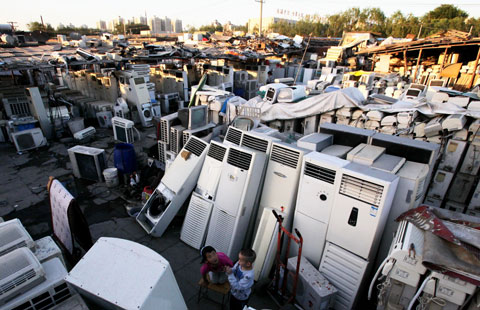Dam proposal opens the floodgates of debate
By Li Jing (China Daily) Updated: 2012-02-28 08:16Pollution concern
Such concerns appear to give Jiangxi officials a legitimate reason to push the dam proposal with urgency.
The website of the provincial water conservation bureau has a detailed record of how often its staff members have traveled to Beijing to lobby the central government. Over the last 12 months, top officials have regularly visited the ministries of water conservation, environmental protection and forestry, as well as the National Development and Reform Commission and other departments, to "plead with them to speed up the review of the Poyang project".
However, provincial authorities have mentioned little about the irreversible environmental impact the dam could have.
Environmental expert Wang warns that the water quality in Poyang Lake's peripheral areas is likely to deteriorate because the sluice gates will slow down if not completely cut off the winter water flow that dilutes and flushes out pollutants.
"A dam will definitely change the natural hydrological process," he said, "The pollutants will be kept in the lake if the water flow is cut off."
Poyang Lake has so far escaped major industrial pollution, due largely to the relative slow economic development in Jiangxi. It is also one of only two sizeable lakes in the middle and lower reaches of the Yangtze that still retain a natural connection to the huge river.
Its natural ecosystem clear but shallow water, aquatic resources and scattered wetlands sustain a large population of water birds, with about 98 percent of the world's endangered Siberian cranes depending on its marshes for survival each winter, according to the International Crane Foundation.
A dam would destroy the lake's natural state, critics say, although water authorities insisted that the province will store supplies only in dry seasons and will ensure the water remains clear.
With more water available for agricultural and industrial use, however, Wang predicted that more factories will likely be built, bringing new sources of pollution, especially as Jiangxi authorities are desperate to boost the local economy.
Meanwhile, a more direct result of the project will be the flooding of the Siberian crane's winter habitat, said Chen Kelin, director of Wetlands International China.
In 1992, about 5 percent of the lake's wetland was listed as being of international importance under the Ramsar Convention, an intergovernmental treaty on conservation and the use of wetlands.
"China actually has an international obligation to protect the status of Poyang Lake, which Jiangxi officials seldom mention in their pursuit of the project," Chen said.
- Seven villagers murdered in N China
- China steps up tobacco control efforts
- Five jailed for separatism in Xinjiang
- Letter asks for leniency in poisoning case
- Antibiotics in surface water pose 'indirect health risk'
- Tianjin airport opens up transit link to Beijing
- High levels of antibiotics in China's major rivers
- China to dig tunnel for Asian rail system
- Bering strait line to US possible, experts say
- China: Stop oil rig harassment







